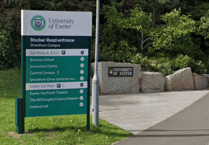In this great country of ours there can be few, if any, days which loom larger in the nation’s awareness and sense of importance than the second Sabbath of November; Remembrance Sunday.
The actual day of recollection of the mighty sacrifice made by the men and women of the United Kingdom takes place at the eleventh hour of the eleventh day of the eleventh month of every year to signify the end of that brutal bloodbath that was the First World War – now some 103 years ago.
Most formal services and homages regarding the ending of these savage hostilities however will always be held on a Sunday – which they were again this year. I make mention of this fact simply as a reminder that last year was an occasion – one of exceeding few in the one hundred years since the creation of The Royal British Legion (1921) that major Remembrance parades, services and tributes did not proceed. The reason for this, of course, was that which caused such disruption across the globe during the benighted, pestilent year that was 2020 – Coronavirus.
‘Lockdown’ was the word – and almost prison like sentence – which afflicted billions of us worldwide; it is a word which chills the spine, and will continue to do so as there remain vast numbers across the continents still entangled in its stifling – but unavoidable – bondage. Indeed, Covid-19 remains the ‘spectre at the feast’ throughout our own islands – an ever present threatening menace which, one fears, could strike again at any time.
However, whilst it has not been conquered, it has, thanks to vaccines, been neutralised to such an extent in this land of ours that we are able to live our lives with some freedom once more, to rejoin the routines and habits which guided our paths, and made our existence fulfilling, pre-pandemic. However, we must constantly be aware of the need for caution and common sense as whilst this malevolent plague may at present be held at bay, it is far from defeated; it could be it never will be.
Such thoughts however did not loom large on the morning of the second Sunday in November this year as church bells rang out inviting the faithful to, once again, legitimately worship in their ancient aisles. To The Royal British Legion, however, the day had much greater pertinence; across the land, the multitude of war memorials in cities, towns, villages, even hamlets, could host services once more. Hymns could be sung, prayers uttered, the names of the fallen read out, the Last Post – then Reveille – played by stalwart trumpeters; and, of course, wreaths and other symbols of homage laid; most vital of all, folk could feel close to those who had given their lives in the cause of the freedom and well-being of us all, whether family, friend or total stranger. For all were, as is carved in the granite of so many cenotaphs, ‘the flower of their generation and the glory of their times’.
Such took place on Sunday November 14. Now it would seem that God was in favour of such tribute as he or she gave weather probably as good as one could reasonably expect in late autumn – dry, mild, windless with the occasional sunny spell. A crowd began to gather near the immaculately maintained ‘monument to memory’ standing in front of the ancient, recently renovated Guildhall lying adjacent to the spacious square at the centre of our historic stannary and market town. All ages came together to show their respect and stood silently facing the shrine upon which, in black, are printed the names of the local citizens who died in the two World Wars.
There were too, naturally, an abundance of military personnel both past and present – army, navy, air force, territorials, cadets; also, old soldiers who had fought in many a fray during the past 60 years and more, some with arrays of medals which bore silent testament to the horrors they had seen and the service they had given. There was a good turnout of firefighters, police and other civilian services plus a heart-warming, copious array of a younger crop of the human race – brownies, cubs, guides, scouts and so many more, all seemingly pleased to be included and aware of what the occasion was about.
Hymns were sung – including, aptly one feels, ‘Onward Christian Soldiers’; prayers were said, bugles sounded, silences observed and, finally, the national anthem was sung with both sincerity and pride. The service over, there came the march past to that stirring, traditional tune, ‘The British Grenadiers’; despite all that has happened these past couple of years or so – and it could be that our trials are not yet over – the lion-like spirit of our great nation clearly is still there for all to see. Also, crucially, we had adhered to the words of poet Laurence Binyon regarding the fallen; ‘We will remember them.’ We did – and will continue to do so.
A former Teignmouth headmaster made the most of the covid lockdown to write a book.



